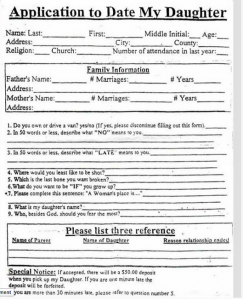The Patriarchy Need Not Apply
I first came across the “Application to Date My Daughter” on Facebook, and I was immediately perturbed. For the uninitiated, it’s pretty self-explanatory – an “application” to be turned into the stereotypical, over-protective dad by a would-be boyfriend. It’s also very disturbing and highly problematic.
I understand that the audience for this type of media is adult males probably in the South or Midwest (disclaimer: I’m from the Midwest) who are very comfortable both with the “old-fashioned family values” that go along with a certain interpretation of Christianity and with “protecting their Second Amendment rights.”
I also understand it’s not the sort of thing you’re supposed to take “seriously.” It’s a joke. It’s on the Internet. But the premise behind it bugs the hell out of me.
There are a number of versions of this application, but I’m going to focus on the one I saw first. Right below the applicant’s personal information is a box for “Family Information,” including the father’s and mother’s names, addresses, number of marriages, and number of years per each marriage. A 2005 study by Nicholas H. Wolfinger shows that children of divorce are more likely to divorce as adults… but why should we treat other people as statistics instead of as individuals? Furthermore, the application’s title specifically says date, not marry, so the inclusion of this family information serves no purpose other than to make applicants (or, really, anyone reading this document) uncomfortable about their family situations.
Then there is a series of violence-based questions: Where would you least like to be shot; which is the last bone you want broken; what do you want to be “IF” you grow up? I thought the premise of this document was to teach boys how to be good boyfriends, good partners, good men. Violence is never part of that answer. Violence is never funny. Little boys don’t need to be taught “don’t hit girls;” children need to be taught “don’t hit people.”
The most intriguing prompt was Please complete this sentence: “A woman’s place is…” I think I’m making a correct assumption when I say that the proper answer to this question is not “in the home.” However, this answer is wildly at odds with the premise of the document as a whole. I’m all for parents looking out for their kids, especially when they’re just starting to test out romantic relationships. That said, if your daughter’s place is not in the kitchen, then surely she can be trusted to pick out her romantic partners, to set her own parameters?
Because I’m all for equal opportunity sexism, I Googled “Application to Date My Son…” and, of course, found one. A few highlights from the basic information section include height, weight, and if the applicant in question has ever been pregnant. One prompt asks for applicants’ positions on wearing revealing clothing – this could be a blog post of its own, so let me simply say that if you don’t want your son dating someone who dresses “provocatively,” maybe you should talk to your son about your standards and societal pressure, rather than shaming his potential partners.
My two favorite portions of the application are a question affirming that the applicant understands that sexting is a violation of child-pornography laws (my thoughts: it’s possible your son gave off signals that this sort of exchange would be acceptable to him) and a statement that indicates that the applicant comprehends that the boy’s parents “believe that the defense of their minor, à la Second Amendment, does not discriminate between male and female protagonists.” Equal opportunity violence! We obviously no longer have any need for feminism.
But why bother ripping these applications to shreds at all? Why waste my time being frustrated by something even whose creators only take half-seriously?
It is irritating that someone would think to create this sort of document at all. If the applications existed in an otherwise sexism-free culture, maybe they’d be funny (when that day arrives, I’ll go back and read these and let you know). Instead, these applications are just one of the thousands of symptoms of a culture that continues to condone and reproduce patriarchal structures.
Obviously, we don’t have time to argue with every sexist, racist, homophobic (and so forth) individual on the Internet, or even in “real life.” I recognize that we have to pick our battles to stop ourselves from burning out. But occasionally, I feel it necessary to acknowledge the casual sexism that infiltrates our newsfeeds by generally well-meaning people.
Miel Jasper
Managing Director Scr ’16

![[in]Visible Magazine](https://community.scrippscollege.edu/invisible/wp-content/uploads/sites/5/2011/04/Invisible-Masthead-2011-Spring1.png)









No comments yet... Be the first to leave a reply!